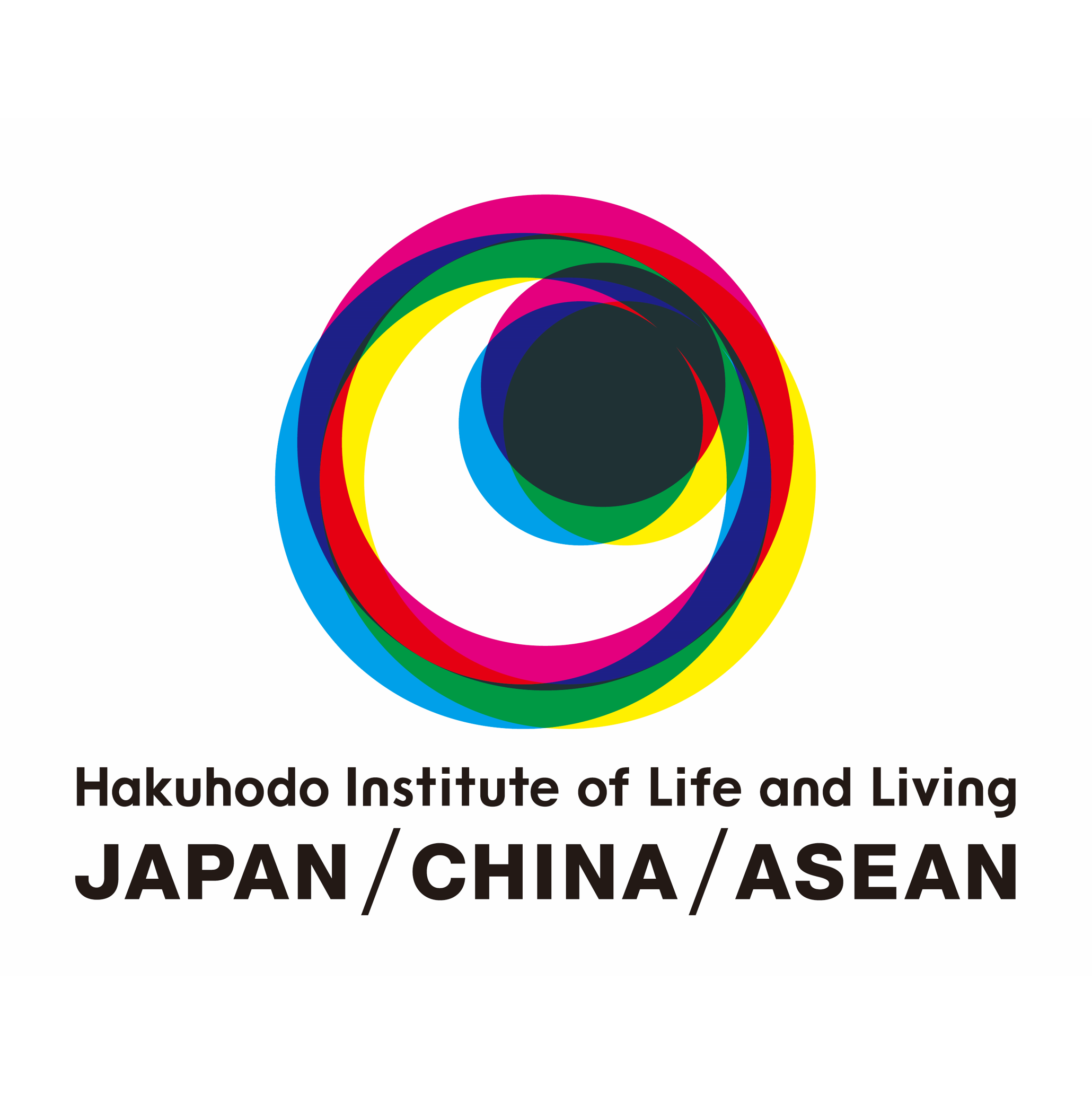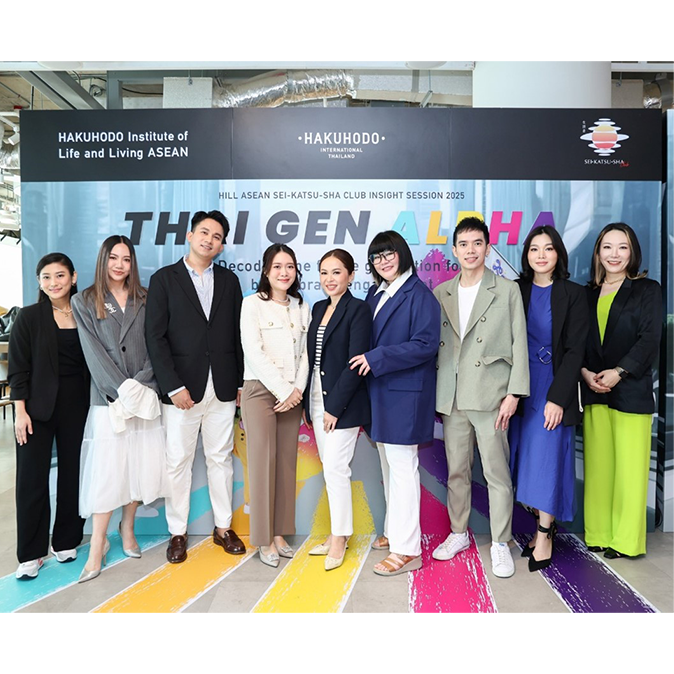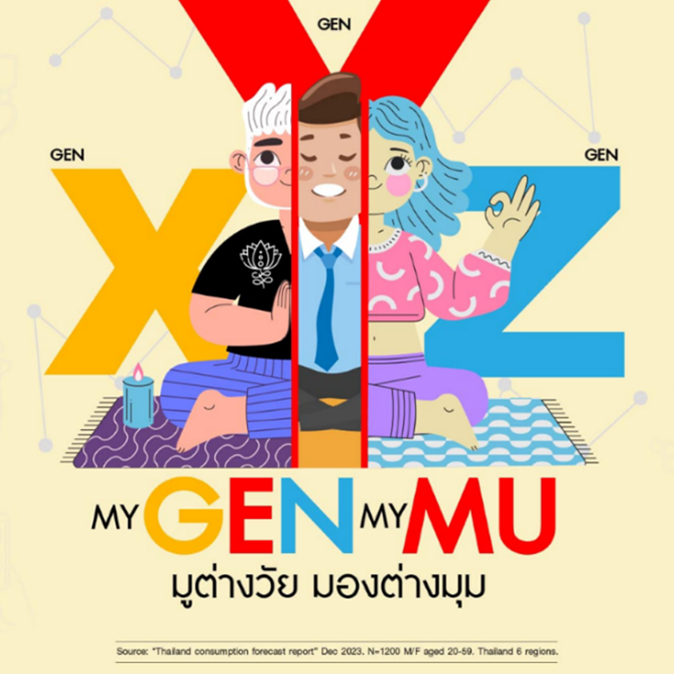- Research
- HILL
Hakuhodo Consulting Asia Pacific (HCAP) is the regional headquarters of Hakuhodo Consulting Inc., the consulting arm of Hakuhodo Inc. Specializing in branding and marketing consulting services for Asia, the company has a strong track record of working on a range of projects with some of the world’s leading companies. It collaborates closely with Hakuhodo’s global network and alliances, helping clients to grow their business in Asia leveraging core expertise in sei-katsu-sha* insight, brand management and marketing implementation.
In this article, we talk to HCAP’s Chief Intelligence Officer, Kumiko Horiba, and Louis Chan, a Consultant, about the company and its recent research into Gen Z, where it collaborated with China-based brand consulting firm Ylab.
What kind of services does HCAP provide?
KUMIKO: HCAP provides business and brand consulting services based on Hakuhodo’s Sei-katsu-sha Insight philosophy, powered by cutting edge AI solutions. “Sei-katsu-sha” is a term we use at Hakuhodo to describe people not simply as consumers, but as fully rounded individuals with their own lifestyles beyond their purchasing behaviors. As Hakuhodo’s international consulting arm located in Singapore, we specialize in understanding sei-katsu-sha across the ASEAN region and beyond. We position ourselves as a business strategy consulting firm that creates the future with sei-katsu-sha and explores new possibilities of business growth for our clients. HCAP offers two types of consulting services, one that utilizes cutting edge AI tools to gather sei-katsu-sha market intelligence to empower clients with insights for strategic business decisions, and another that provides brand business consulting through a multidisciplinary approach, by integrating creativity and strategy.
Tell us about your research into Gen Z
LOUIS: Leveraging cultural models and social listening tools powered by AI, we embarked on this Gen Z research initiative to demonstrate our AI-powered research capabilities and position ourselves as a leading consulting firm specializing in ASEAN sei-katsu-sha. The central hypothesis of the research is that although Asian Gen Zs share common traits as digital natives, their life values are distinctly shaped by the unique macro environments of their respective countries. Building on this hypothesis, the research identified the various Gen Z personas across the region and determined which persona is most representative of each country.
For this project, we collaborated with Ylab, a human-centric brand consulting firm based in China, to deepen our understanding and ensure cultural relevance.
How did your collaboration with Ylab come to be, and what responsibilities did each team have in the research project?
LOUIS: We joined hands with Ylab for this research project because we believed that the two companies could learn from and complement each other’s expertise. HCAP specializes in utilizing cutting-edge AI tools to uncover insights into ASEAN sei-katsu-sha that traditional market research methods overlook. Ylab is an innovative brand consultancy based in China, with expertise in analyzing the behaviors and preferences of Chinese sei-katsu-sha. It employs a three-tier framework to analyze lifestyles from macro-social, meso-social, and micro-social perspectives, viewing them as an interconnected ecosystem (Image 1). For this research project, we integrated our AI capabilities with Ylab’s framework.
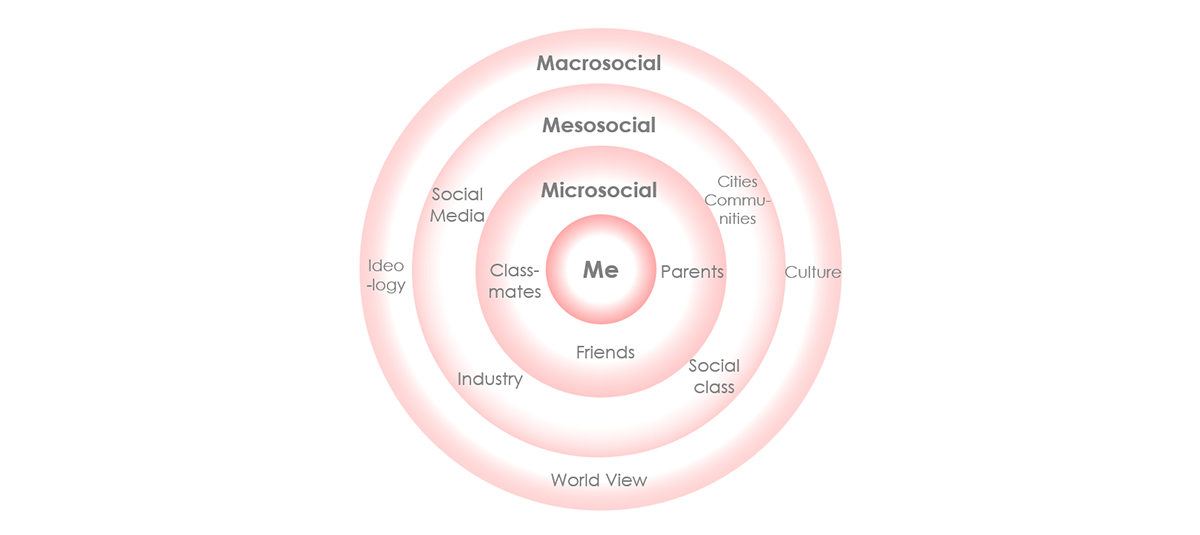 (Image 1) Lifestyle analysis framework
(Image 1) Lifestyle analysis frameworkWhat was the methodology used to conduct the research?
LOUIS: We conducted both quantitative and qualitative research. For the quantitative research, we utilized Global HABIT, a survey that has tracked lifestyles, brand preferences, purchasing behaviors and media interactions in over 35 cities worldwide annually since 2000. This allowed us to understand the life values and purchase behaviors of Gen Z sei-katsu-sha in ASEAN, while also identifying representative personas for each country. We used QUILT.AI, a company that converts big data signals into human insights and cultural meanings, to qualitatively understand social phenomena among Gen Zs online based on local phrases and trending keywords for each country. We also used QUILT.AI to plot social text on semiotics maps to interpret social phenomena clusters and each country’s Gen Z trends.
How do Gen Z trends vary across Asia and what factors have contributed to these similarities and differences?
LOUIS: Gen Zs all over the world grew up in a digital environment. Gen Zs across Asia share similar traits, such as being adept at social media, being emotionally intelligent and having a desire to seek like-minded peers for community belonging. The key point of interest lies in the differences, with the factors driving these disparities rooted in the unique macro-social environments of each country. Based on macrosocial environments, we can see how Gen Zs in different countries have different life values from each other. We identified Gen Z personas for each country based on the axes self-orientation vs. social-orientation and upwardly ambitious vs. laid-back. For example, the most representative characterization of Gen Z in China and Vietnam is the self-driven Hungry Climber who has social aspirations and believes that money is a symbol of success. They seek brands that appropriately reflect their social status and align with their aspirations. Singaporean Gen Zs share characteristics of both Hungry Climbers and My Family, My World, who value family relationships over everything else. On the other end of the spectrum, Thai Gen Zs are not so particular about social aspirations and prefer living at their own pace: they are best characterized as My Life, My Way. Gen Zs from Malaysia, Indonesia and the Philippines generally prioritize family and religious traditions. For the Gen Zs in these countries, brands that emphasize community tend to resonate well.
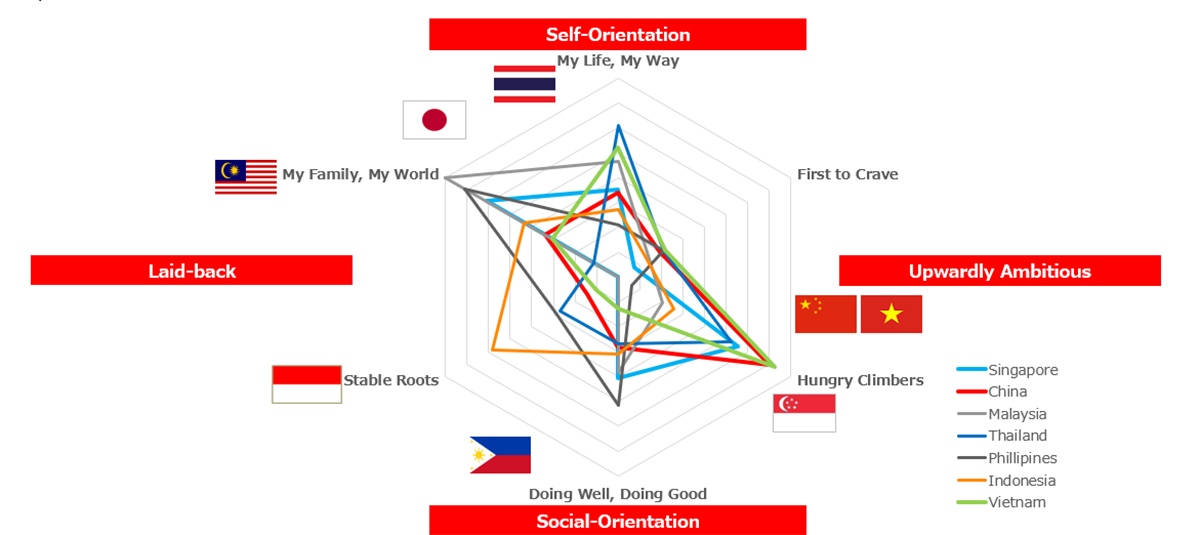 (Image 2) Persona cluster map
(Image 2) Persona cluster mapCould you explain how Gen Zs adeptly navigate social interactions, and how they vary across different countries?
KUMIKO: We conducted a keyword analysis of the social phenomena of Gen Zs, and found that Gen Zs use smart tactics to fit into society while protecting themselves. Gen Zs generally live in a digital social media world and seek community belonging. Furthermore, research analysis on social-orientation vs. self-orientation revealed that Gen Zs have developed smart strategies for connecting with others while protecting their own identities and adapting to society. Within these communities, there are unique codes for participation and implicit rules that only those in the know can navigate. These implicit rules help Gen Zs minimize the risk of emotional harm in relationships while enabling them to build meaningful connections with like-minded peers who share their values and interests. Additionally, they adopt strategic approaches to integrating into society intelligently, utilizing self-awareness tools like MBTI personality assessments. They are highly attuned to the emotions of others and seek validation from their peers.
However, depending on the country, Gen Zs may have different strategies to navigate social relationships. For example, Thai, Malaysian, Japanese and Indonesian Gen Zs generally draw on the strategy of cultural idealism in community. They possess strong regional pride and often associate with like-minded peers from the same region, which helps them build a sense of community and, at times, exclude outsiders during social interactions. Meanwhile, Chinese and Vietnamese Gen Z individuals tend to be more self-oriented, skilled at socializing, and focused on striving for success. They also establish healthy boundaries around their personal time to prevent burnout.
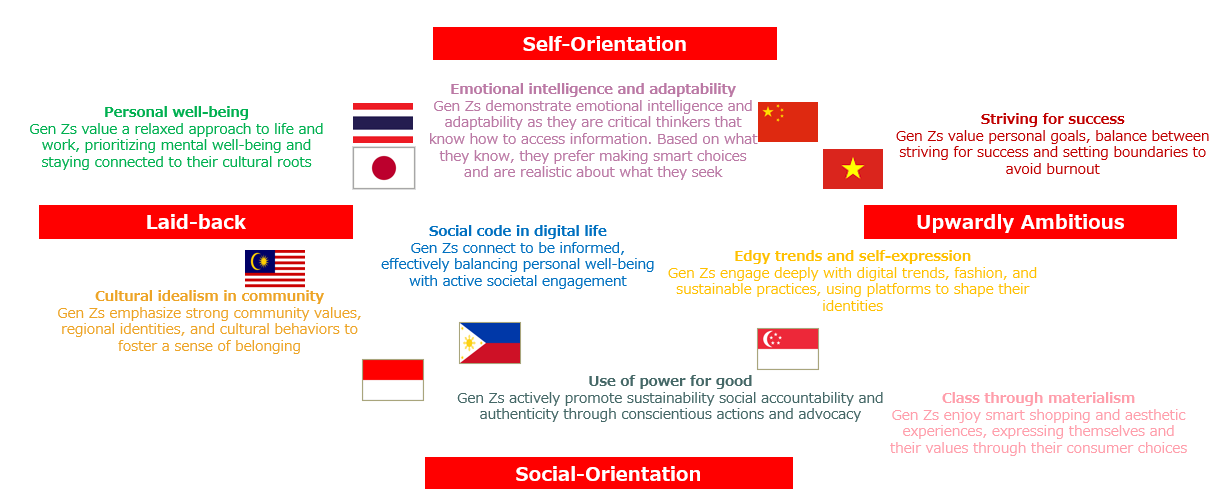 (Image 3) Smart strategies for social interactions
(Image 3) Smart strategies for social interactionsWhat are the implications for brands aiming to market to Gen Z in Asia, and what new marketing opportunities does this present for companies and brands?
LOUIS: In short, Gen Z in Asia generally prefers brands that are authentic and innovative. Having grown up in the digital world, they are critical thinkers who can easily identify brands that lack sincerity and effort in communication. They also have a strong preference for brands that are creative enough to offer immersive experiences that engage all their senses. When Gen Z finds a brand that shares similar values, they are likely to become passionate advocates and purchase products to show their support. It would be even more beneficial if the brand fosters its own community, as Gen Zs tend to socialize with like-minded peers and value a sense of community belonging.
Any final words?
KUMIKO: At HCAP, we are proud of our deep expertise in sei-katsu-sha across Asia, our distinctive approach revealed in this research, and our commitment to delivering value as a trusted partner of brands navigating today’s complex and dynamic landscape. We are steadfast in our mission to drive innovation, foster meaningful connections, and deliver measurable impact for our clients across the region and beyond.


Hakuhodo Consulting Asia Pacific site:
https://www.hakuhodo-consulting-asiapacific.com/
Summary of the Asian Gen Z Research:
English Report
* “Sei-katsu-sha” is a term we use to describe people not simply as consumers, but as fully rounded individuals with their own lifestyles, aspirations and dreams.














